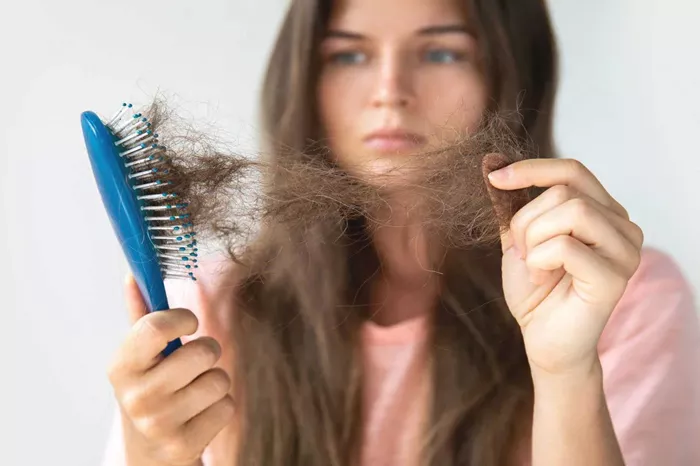Hair fall, a common concern for many individuals, can be attributed to a variety of factors ranging from genetics to lifestyle choices. Among these factors, nutrient deficiency stands out as a significant contributor to hair loss. In this comprehensive guide, we delve into the impact of nutrient deficiency on hair health, focusing on the key nutrients essential for maintaining strong and healthy hair.
The Link Between Nutrient Deficiency and Hair Fall
Hair follicles, like any other part of the body, require a constant supply of essential nutrients to support growth and maintenance. When the body lacks these vital nutrients, it can manifest in various ways, including hair fall. While several nutrients play a role in hair health, certain deficiencies have been specifically linked to increased hair loss.
Understanding the Role of Essential Nutrients
1. Iron: Iron deficiency, known as anemia, is a common cause of hair loss. Iron is essential for the production of hemoglobin, which carries oxygen to the body’s cells, including the hair follicles. When iron levels are low, it can disrupt the hair growth cycle, leading to increased shedding and thinning of hair.
2. Vitamin D: Often referred to as the “sunshine vitamin,” vitamin D plays a crucial role in hair follicle cycling and hair growth. Research suggests that vitamin D receptors are present in the cells of hair follicles, indicating its importance in maintaining healthy hair growth. Deficiency in vitamin D has been associated with various hair disorders, including alopecia areata.
3. B Vitamins: The B-complex vitamins, including Biotin (B7), Niacin (B3), and Pantothenic Acid (B5), are essential for healthy hair growth. Biotin, in particular, is well-known for its role in promoting hair strength and thickness. Niacin helps improve blood circulation to the scalp, ensuring a steady supply of nutrients to the hair follicles, while Pantothenic Acid supports the production of keratin, the protein that makes up hair strands.
4. Zinc: Zinc is another micronutrient crucial for maintaining healthy hair follicles. It plays a vital role in DNA and RNA synthesis, cell division, and protein synthesis, all of which are essential for hair growth and repair. Zinc deficiency has been linked to hair loss and scalp conditions such as dandruff and alopecia.
Addressing Nutrient Deficiency with Proper Nutrition and Supplements
To combat hair fall caused by nutrient deficiency, it’s essential to prioritize a balanced diet rich in the aforementioned nutrients. Incorporating foods such as lean meats, fish, eggs, dairy products, nuts, seeds, and leafy green vegetables can help ensure an adequate intake of iron, vitamin D, B vitamins, and zinc.
In addition to dietary changes, supplementation may be necessary, especially for individuals with severe deficiencies or those following restrictive diets. However, it’s crucial to consult with a healthcare professional before starting any supplementation regimen to determine the appropriate dosage and ensure safety.
Shampoo Selection for Strengthening Hair
While proper nutrition lays the foundation for healthy hair growth, external factors such as hair care products also play a significant role. When selecting shampoos aimed at strengthening hair, it’s essential to consider the following factors:
1. Ingredients: Look for shampoos enriched with natural ingredients known for their hair-strengthening properties. Ingredients such as vitamin B3 (Niacin), castor oil, caffeine, and niacinamide can nourish the scalp, stimulate hair growth, and improve overall hair health.
2. Avoid Harmful Ingredients: Avoid shampoos containing sulfates, parabens, silicones, and phthalates, as these harsh chemicals can strip the hair of its natural oils and lead to dryness and damage. Opt for sulfate-free formulations that are gentler on the hair and scalp.
3. Product Recommendations: Based on different hair types and specific needs, here are some recommended shampoos known for promoting hair strength and vitality:
For Thinning Hair: Clinical-strength formulas like Rogaine 2% Minoxidil Topical Solution or Mielle Pomegranate & Honey Shampoo can help address thinning hair and promote regrowth.
For Natural Hair: African Pride Moisturizing Shampoo with honey and coconut oil is an excellent choice for nourishing and strengthening natural hair.
For Straight Hair: Consider Virtue Labs Flourish Shampoo specifically formulated for thinning hair, providing the necessary support for maintaining strength and resilience.
Overall: For overall hair health and strength, options such as Vegamour GRO+ Advanced Replenishing Shampoo, Garnier Fructis Grow Strong Shampoo, and Redken Extreme Length Shampoo with Biotin offer effective solutions for various hair types and concerns.
Conclusion
In conclusion, nutrient deficiency can significantly impact hair health and contribute to hair fall. By addressing deficiencies through proper nutrition, supplementation, and selecting appropriate hair care products, individuals can promote stronger, healthier hair. Remember, achieving and maintaining healthy hair requires a holistic approach, combining internal and external care practices for optimal results.
you may be interested

